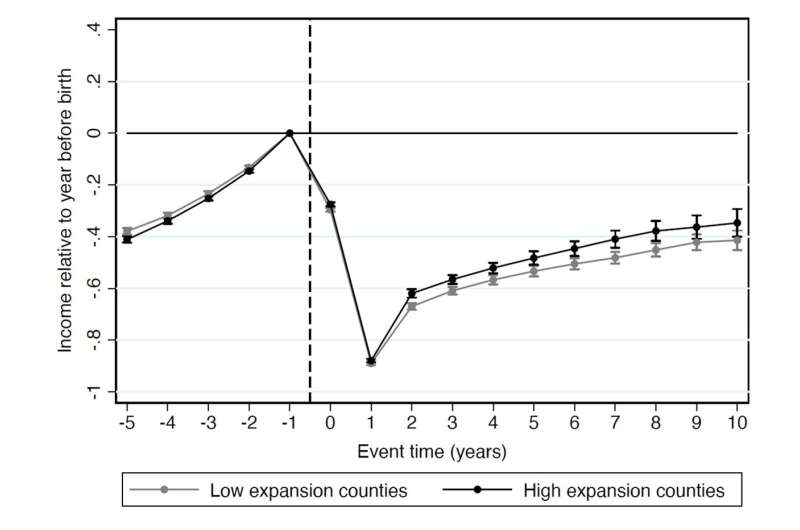This article has been reviewed according to Science X's editorial process and policies. Editors have highlighted the following attributes while ensuring the content's credibility:
fact-checked
proofread
Equality in the labor market needs more than public childcare, economists say

Having children poses serious financial challenges. One researcher to demonstrate this is U.S. economist Claudia Goldin, who was awarded this year's Nobel Prize in Economic Sciences for her research on gender differences in the labor market.
Science has coined the term "child penalty" to describe the phenomenon of penalizing parenthood. According to current scientific understanding, mothers bear the main burden of the child penalty while fathers come off more lightly. In Germany, this phenomenon is particularly pronounced. One reason for this is that many women return to the labor market part-time while continuing to provide unpaid care work at home.
Economists from the Universities of Passau and Potsdam have investigated whether increasing the number of childcare slots for children under three would mitigate these long-term consequences. The assumption would be that a faster return to the labor market should improve a mother's chances of professional advancement. However, the economists found no such effect.
Geske Rolvering from the University of Passau summarizes the study's findings as follows: "Public childcare—in its current form in Germany—supports a quick return to work. But the system reaches its limits when it comes to mothers' careers." Rolvering is a doctoral candidate at the Chair of Public Economics. The study, which she conducted together with Katrin Huber from the University of Potsdam, is part of her cumulative thesis.
Using microeconometric methods, the researchers analyzed data on mothers in western Germany who gave birth to their first child between 2005 and 2019. Although several family-policy reforms launched in the 2005 to 2008 period led to a substantial increase in available childcare slots, the speed and intensity of expansion varied substantially between German counties, mainly due to the existence of administrative hurdles.
Huber and Rolvering were able to make use of this regional variation for their study. To draw conclusions about mothers' career advancement, the economists combined social insurance data provided by the Institute for Employment Research in Nuremberg with figures from an employment survey conducted in 2018 by the Federal Institute for Occupational Safety and Health and the Federal Institute for Vocational Education and Training.
The results in a nutshell:
- Public childcare helps mothers to return to work more quickly after childbirth. The likelihood of returning to work two years after childbirth is 5.5 percentage points higher in high-expansion counties compared to low-expansion counties.
- However, most mothers return to work only part-time.
- The availability of public childcare has a negligible effect on career advancement or on the probability of being employed in demanding jobs or in a position with managerial responsibilities.
- The researchers also investigated whether certain groups of women, such as those with higher incomes or in less family-friendly jobs, benefit more than others. Again, no effect was found.
In their study, the researchers emphasize, "Our findings should not be interpreted as suggesting that public childcare is pointless. […] Rather, in the German context, there is a clear need for further efforts at various levels in order to promote gender equality in the labor market." Accordingly, the demand for childcare slots in large cities continues to exceed their supply. Moreover, other studies have shown that traditional gender roles are still prevalent in German-speaking countries, resulting in more mothers staying at home.
The study conducted by Rolvering and Huber, titled "Public Child Care and Mothers' Career Trajectories," has appeared as a discussion paper in the series published by the IZA—Institute of Labor Economics. Papers in this series are preliminary publications that have yet to be peer-reviewed.
The economists' work builds on earlier research by the University's Chair of Public Economics evaluating the impact of labor and family polices, including family-related benefits. In a previous study, Professor Stefan Bauernschuster showed that publicly-funded childcare increases the labor force participation of mothers. The study has received widespread public attention and was cited in the latest US Economic Report.
More information: Katriin Huber et al, Public Child Care and Mothers' Career Trajectories (2023).
Provided by Universität Passau



















